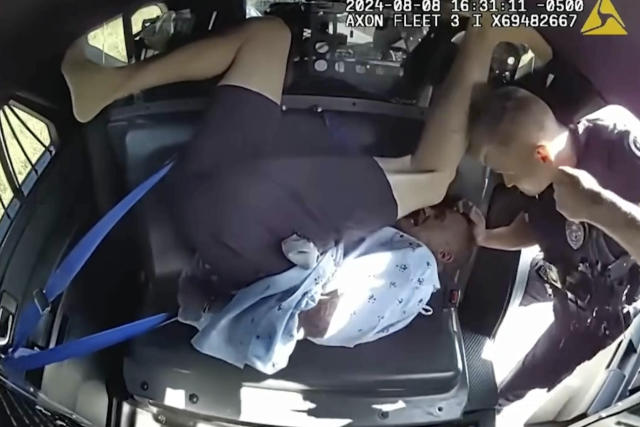
What constitutes accountability in law enforcement, and at what point do the actions of a police officer transcend the boundaries of acceptable behavior? An incident in Arkansas has once again ignited these pressing questions. A police officer’s termination in response to violent conduct against an inmate has prompted public debate, shedding light on broader concerns surrounding police brutality and the treatment of individuals in custody.
🚨Get your crypto exchange secret bonus right now.🚨
Incident Overview
The recent episode that resulted in the dismissal of an Arkansas police officer underscores critical issues in the relationship between law enforcement and the communities they serve. This situation arose when a video surfaced, depicting an officer physically assaulting an inmate in the back of a patrol car, sparking outrage and demanding accountability.
Nature of the Incident
The disturbing content of the video revealed an officer aggressively beating an inmate, a scene that many observers found both shocking and unacceptable. The nature of such conduct raises alarming questions about training, oversight, and the ethical obligations of law enforcement personnel.
This incident is not isolated; it reflects a larger pattern of behavior that has drawn scrutiny on a national scale. The violence exhibited was not only a breach of protocol but also a fundamental violation of the principles of justice and humanity that law enforcement is supposed to uphold.
Public Reaction
As the video circulated, public outrage escalated, leading to protests and calls for accountability. Many citizens expressed their dismay not only at the actions of the officer but also at the systemic issues within police departments that may allow such behavior to go unchecked. The outcry has contributed to intensified criticism of law enforcement practices and a call for reform.
Public condemnation highlights a growing awareness and intolerance for police brutality, particularly in an era where accountability is demanded more than ever. Each incident resonates with communities already strained by concerns of injustice and inequality, making the implications of this event particularly significant.
Officer’s Dismissal
In light of the widespread outrage, the local police department made the decision to terminate the officer involved in this reprehensible act. Such decisive action signifies a step toward addressing accountability and restoring community trust, albeit amid a backdrop of ongoing concerns regarding police conduct.
Context of the Dismissal
The firing of the officer represents not just a punitive measure but also a strategic move by the police department to align with shifting public attitudes towards transparency and reform within law enforcement. The swift response contrasts sharply with historical instances where police misconduct was met with minimal repercussions.
This context is essential for understanding the evolving landscape of police accountability. Increased visibility of such incidents—often captured through smartphones and shared through social media—has added pressure on departments to enact meaningful change in their policies and practices.
Impacts on Police Accountability
The officer’s firing contributes to a larger discourse surrounding the need for accountability mechanisms within police departments. This incident, coupled with others, might foster an environment where officers are more aware of their actions and the potential consequences of misconduct.
It is imperative for law enforcement agencies to establish robust frameworks to address instances of brutality. Such frameworks could include comprehensive training programs addressing de-escalation techniques, as well as initiatives promoting respect and understanding of the rights of individuals in custody.
🚨Get your crypto exchange secret bonus right now.🚨
Broader Implications for Police Reform
The incident in Arkansas serves as a flashpoint in ongoing discussions about police reform across the nation. It highlights systemic issues that require urgent attention and action.
Systemic Issues in Law Enforcement
The beating of an inmate by a police officer mirrors larger systemic issues that extend beyond individual misconduct. There exists a critical need to address the culture within many law enforcement agencies that has often tolerated aggressive behavior towards those in custody.
Reports indicate that systemic issues can include inadequate training, lack of oversight, and a prevailing “us versus them” mentality. By critically analyzing these issues, stakeholders can work toward holistic reform that not only holds individuals accountable but also transforms institutional practices.
Call for Transparency
With increasing demands for transparency, law enforcement agencies are under pressure to provide the public with insights into their operations and decision-making processes. Transparency fosters trust and can mitigate many issues outlined in this incident.
Promoting transparency involves not just releasing information but also engaging with communities in meaningful dialogues. This could include community forums, independent reviews of incidents, and opportunities for citizens to express their concerns and expectations.
Treatment of Inmates in Custody
One of the critical aspects of this incident revolves around how individuals in custody are treated by law enforcement. The inhumane treatment of inmates is a prevalent concern that continues to resonate with both activists and the broader community.
Ethical Obligations of Law Enforcement
Law enforcement officials have ethical obligations to protect and serve all individuals, regardless of their legal status. They are bound to uphold the law in a manner that respects the rights and dignity of every person. The violent behavior of the officer not only violated these principles, but it also exacerbated public distrust.
Many argue that law enforcement agencies must implement policies that strictly prohibit the use of excessive force and ensure that all officers are held accountable for their actions. Training programs that emphasize ethical behavior and human rights are imperative in reshaping the expectations and responsibilities of police officers.
Support for Mental Health and Wellness
Beyond physical treatment, the mental health and wellness of inmates also warrant significant attention. Many individuals in custody may be experiencing psychological distress or trauma, which often compounds their circumstances.
Incorporating mental health professionals into police departments could aid in finding alternative methods for handling crises, while also assuring inmates receive the necessary support. The intersection of mental health and justice is a critical area ripe for reform, which requires collaboration between law enforcement agencies and mental health advocates.
The Path Forward
The incident involving the Arkansas police officer is not merely an isolated event but rather a significant milestone in the ongoing conversation about police conduct and accountability. Although the officer’s termination is a step in the right direction, it is evident that larger systemic changes are necessary to prevent future occurrences of brutality.
Legislative Action
Encouraging legislative reform can play a pivotal role in shaping the future of law enforcement practices. Policymakers have an opportunity to enact comprehensive reforms aimed at rebuilding trust between the police and the communities they serve.
Legislation could include measures that promote the use of body cameras, implement independent oversight committees to investigate incidents of police misconduct, and provide funding for training focused on de-escalation techniques and community engagement.
Community Engagement
Strengthening relationships between law enforcement agencies and the communities they serve is crucial for fostering a safe and just society. Encouraging community engagement initiatives can provide a platform for discussions regarding concerns and expectations related to policing.
Such initiatives may include community policing programs that prioritize building connections and understanding between officers and residents. Implementing regular community forums where events like the Arkansas incident can be discussed openly allows for a shared commitment to reform and collaboration in addressing systemic issues.
Conclusion
As society navigates the implications of this incident, it is essential to recognize that accountability in law enforcement is not merely a response to individual acts of violence; it is a fundamental shift in how justice is administered. The structural changes needed to ensure ethical policing extend beyond punitive action and require a commitment to reform at all levels of the criminal justice system.
Moving forward, stakeholders across the spectrum—law enforcement, government bodies, community organizations, and the public—must engage in constructive dialogue to foster an environment where respect, dignity, and justice are paramount. This incident serves as both a cautionary tale and a rallying cry for systemic reforms, demanding attention to the treatment of individuals in custody and the responsibilities of law enforcement to act with integrity.



